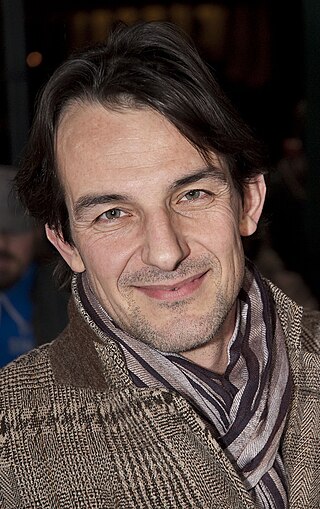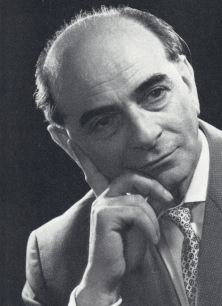Related Research Articles

Norbert Blüm was a German politician who served as a federal legislator from North Rhine-Westphalia, chairman of the CDU North Rhine-Westphalia (1987–1999), and Minister of Labour and Social Affairs.
The Munich Philharmonic is a German symphony orchestra located in the city of Munich. It is one of Munich's four principal orchestras, along with the Bavarian Radio Symphony Orchestra, the Munich Radio Orchestra and the Bavarian State Orchestra. Since 1985, the orchestra has been housed in the Gasteig culture centre.
The Little Polar Bear is a franchise about a polar bear cub named Lars who first starred in a number of books written by Dutch author, Hans de Beer.

Moritz Eggert is a German composer and pianist.

Friederike Mayröcker was an Austrian writer of poetry and prose, radio plays, children's books and dramatic texts. She experimented with language, and was regarded as an avant-garde poet, and as one of the leading authors in German. Her work, inspired by art, music, literature and everyday life, appeared as "novel and also dense text formations, often described as 'magical'." According to The New York Times, her work was "formally inventive, much of it exploiting the imaginative potential of language to capture the minutiae of daily life, the natural world, love and grief".

Dieter Dorn is a German theatre director, also for the opera, the manager of the Münchner Kammerspiele from 1983 to 2001 and now manager of the Bavarian Staatsschauspiel.

Hans Werner Meyer is a German film and television actor.

Rolf Zuckowski is a German singer-songwriter. He has written and composed music especially for children, but his songs are very popular among adults, too. His compositions involve children in music throughout their childhood and accompany their daily life. Meanwhile, many of his songs have attained the status of Folk songs.
Erwin Moser was an Austrian children's and young adult books' author and illustrator. He is best known for his children's book series Manuel & Didi, which he illustrated himself, using a text comics format.
In music, the Cologne School is a loosely associated group of composers and performers of the generation that came to prominence in the 1970s, who lived and worked in the city of Cologne, Germany.

Sabine Derflinger is an Austrian film director, screenwriter, producer and dramaturgical consultant. She lives and works in Vienna and Berlin. Many of her films have won several awards, notably Geraubte Kindheit, Vollgas, Kleine Schwester, 42plus and Tag und Nacht. She is also well known for directing a number of films in the cult series Tatort.

HansWinterberg was a Czech-German composer.
Peter Janssens was a German musician and composer who wrote and performed incidental music for several theatres, and songs and musicals of the genre Neues Geistliches Lied, a pioneer of Sacropop. He worked at a German theatre in Buenos Aires, set several works by Ernesto Cardenal to music and composed in 1992 a passion music, in memory of 500 years after the European invasion in Latin America.
Leopold is a biennial German media prize for music for children, subtitled "Gute Musik für Kinder".
Gerd R. Ueberschär is a German military historian who specialises in the history of Nazi Germany and World War II. He is one of the leading contributors to the series Germany and the Second World War and, together with Rolf-Dieter Müller, is the author of Hitler's War in the East 1941−1945: A Critical Assessment. Both works have been published in English translations.
The Neue Musikzeitung is a magazine focused on classical music.

Rolf Alexander Wilhelm was a German composer, film composer, arranger and conductor.

Christian Redl is a German actor and singer.

Ulrike Krumbiegel is a German actress. She has performed in more than 100 film and TV productions. In her early career, she performed in East German cinema and theatre. After the re-unification of Germany, her career continued with appearances in crime series such as Tatort, and the ZDF series SOKO München. She has also continued to appear in the theatre, featuring in plays by Berthold Brecht, Henrik Ibsen and William Shakespeare.

Wolfgang Schoor was a German composer, who wrote orchestral works, song cycles and chamber music and the music for numerous children's and documentary films and radio plays.
References
- 1 2 3 "Danke für 10 Jahre Kleiner Tag / Ein Tag feiert Geburtstag!" (PDF) (in German). Hans Sikorski. 3 October 2009. Retrieved 17 April 2019.
- ↑ Brückner, Iris. "Lehrerhandreichungen 'Der kleine Tag'" (PDF). static.universal-music.de (in German). Retrieved 15 April 2019.
- 1 2 3 4 5 "Gute Musik für Kinder / LEOPOLD 2001 / Der Kleine Tag / Das Musical-Hörspiel" (in German). Verband der Deutschen Musikschulen. 2001. Retrieved 15 April 2019.
- 1 2 "Zuckowski, Rolf (Komponist) / Zuckowski, Rolf / Niehaus, Hans / Eicke, Wolfram (Libretto) (Autoren) / Der kleine Tag". theatertexte.de (in German). Retrieved 15 April 2019.
- 1 2 3 4 5 Dörner, Michelle (22 June 2017). "Die Geschichte vom friedlichsten Tag aller Zeiten". medienbewusst.de (in German). Retrieved 17 April 2019.
- 1 2 3 "Der 'Kleine Tag' wird vergoldet – Ehrung für Wolfram Eicke, den "Vater" des Musical-Hörspiels" (in German). Hans Sikorski. August 2012. Retrieved 17 April 2019.